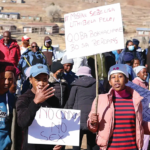At just 18 years old, Pulane Mothebesoane from Thlanyaku in Mokhotlong speaks with a maturity shaped by hard lessons.
Her life changed dramatically at 16 when she fell pregnant and had to leave school, a reality many young Basotho girls know too well.
But Mothebesoane’s story is not just one of hardship. It is a story of resilience, learning, and the power of timely support, especially from initiatives by the United Nations Population Fund (UNFPA).
“Having sexual relationships at an adolescent age is not a good choice because, in most cases, the consequences affect one’s future negatively,” Pulane said.
She reflected on the dangers of transactional relationships with older men, where negotiating condom use is nearly impossible.
“We should not be driven by money,” she added. “Most of these relationships are not with our peers but with older men, and we often can’t ask them to use protection.”
Mothebesoane also spoke about the social pressure and stigma that come with early motherhood. “I have learned that having a baby young does not mean I should get married. What I need is to go back to school and secure my future.”
This clarity, she said, came only after overcoming anger, guilt, and shame.
Now a young mother working occasional jobs to support her child, Mothebesoane said, “If I had the knowledge I have now, I would have made different choices.”
Despite strong support from her parents, she faced judgment from her community. People called her “talkative” and said they “never expected her to fall pregnant.”
Though she lived near a health center, shame kept her from seeking help until six months into her pregnancy. Thankfully, when she did, she received the care she needed.
Sadly, Mothebesoane’s experience is common. “Many girls in Thlanyaku go through this,” she said. “Poverty and the lack of value placed on education push us to drop out, fall pregnant, get married early, or move to South Africa for work—often returning with children we can’t afford to raise.”
This reality is what UNFPA is working to change. During World Population Day commemorations in Mokhotlong, held under the theme “Empowering young people to create families they want in a fair and hopeful world,” UNFPA trained 30 youth from different backgrounds, both in and out of school.
“For someone to be empowered, they need to have knowledge,” said ’Maseretse Ratia, UNFPA’s National Programme Analyst for Behaviour Change Communication. “They must be educated on sexual and reproductive health and how to make informed decisions.”
The training included comprehensive sexuality education, covering pregnancy prevention, emergency contraception, family planning, and how to identify and report gender-based violence (GBV) and sexual abuse.
Ratia also addressed the heartbreaking reality of young people who become parents through no choice of their own.
“Some children are sexually assaulted and end up pregnant or married. They didn’t choose this path,” she said. “UNFPA wants to ensure that all youth know their rights and have access to health services, including free family planning.”
UNFPA’s State of World Population 2025 report highlighted both progress and ongoing challenges in Lesotho’s reproductive health sector.
While 89 percent of births are now attended by skilled professionals, the country’s maternal mortality rate remains high at 478 deaths per 100,000 live births. HIV remains a major concern, with 3.00 new infections per 1,000 uninfected people recorded in 2023.
Contraceptive use stands at 67 percent for modern methods and 50 percent overall, but unmet need for family planning remains at 13 percent among married or in-union women.
The report also revealed that Lesotho’s adolescent birth rate is 53 births per 1,000 girls aged 15–19.
Encouragingly, child marriage has declined significantly, from 24.2 percent in 1999 to 13.4 percent in 2024. Still, intimate partner violence remains a concern, with 16.5 percent of women aged 15–49 having experienced abuse as of the 2018 survey.
Summary
- “Having sexual relationships at an adolescent age is not a good choice because, in most cases, the consequences affect one’s future negatively,” Pulane said.
- Now a young mother working occasional jobs to support her child, Mothebesoane said, “If I had the knowledge I have now, I would have made different choices.
- During World Population Day commemorations in Mokhotlong, held under the theme “Empowering young people to create families they want in a fair and hopeful world,” UNFPA trained 30 youth from different backgrounds, both in and out of school.

Ntsoaki Motaung is an award-winning health journalist from Lesotho, specializing in community health stories with a focus on sexual and reproductive health and rights, as well as HIV. She has contributed to platforms like “Be in the KNOW,” highlighting issues such as the exclusion of people with disabilities from HIV prevention efforts in Lesotho.
In addition to her journalism, Ntsoaki serves as the Country Coordinator for the Regional Media Action Plan Support Network (REMAPSEN). She is also a 2023 CPHIA Journalism Fellow.










